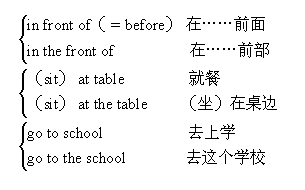冠词是虚词,本身不能单独使用,也没有词义,它用在名词的前面,帮助指明名词的含义。
冠词分为不定冠词a(an)和定冠词the两种。不定冠词仅用在单数可数名词前面,表示“一”的意义,但不强调数目观念,只表示名词为不特定者。
定冠词则表示名词为特定者,表示“这”、“那”、“这些”、“那些”的意思,在可数的单复数名词或不可数名词前面都可以用。
1)不定冠词
We need an apple and a knife.我们需要一个苹果和一把刀子。
1.a和an的区别
不定冠词有a和an两种形式,a用于辅音(不是辅音字母)开头的词前。an用于元音(不是元音字母)开头的词前。
a boy, a university, a European country
u是元音字母,但发音是[ju:],是辅音。
an hour , an honour , an island
h是辅音字母,但它不发音,它的音标是[auə],是元音。
an elephant,an umbrella,an egg
2.另外如果形容词修饰名词时,冠词要放在形容词的前面,用a或an取决于这个形容词的读音。
a building→an old building 一座旧大楼
a boy→an honest boy 一个诚实的男孩
3.不定冠词在句中,一般情况下可不必译出,参见下面前两个例子,但如果它具有数词“one”的意义时,必须译出,参见下面后三例。
“A”在这里只表示是那一类,实际上它的意义和Steel workers make steel.一样。
A steel worker makes steel.
钢铁工人生产钢。
An ear is an organ for listening.
耳朵是听觉器官。
He goes to see uncle Li twice a week.
他一周去看李叔叔两次。
A week has seven days.
一周有七天。
I'll finish my composition in an hour or two.
我一两个小时就把作文做好。
必背!
give a lesson take a bath have a rest
教(一堂)课 洗(个)澡 休息
have a talk have a fever have a good time
听报告 发烧 过得愉快
have(take)a walk have a headache have a ince trip
散步 (toothache…) 旅途愉快
头疼(牙疼…)
2) 定冠词
I bought a watch yesterday.我昨天买了一只手表。
This is the watch.
就是这只表。
1.定冠词的发音
定冠词the只有一种书写形式,但发音有二种形式,在辅音(不是辅音字母)开头的词前弱读为[ðə];在元音开头的词前重读为[ði:]。
the hospital弱读这所医院
the answer重读这答案
2.定冠词的基本用法
a.用在重新提到的人或事物的前面。
I have a bird. The bird is white.
我有一只鸟。它(这只鸟)是白色的。
I bought a coat. This is the coat.
我买了件大衣。这就是那件大衣。
b.用在谈话双方都知道的人或事物的前面。
What did you think of the movie?
你觉得那部电影怎么样?
Please open the window.
请把那扇窗户打开好吗?
c.用在单数可数名词前面,表示某一类人或事物,这和不定冠词的用法相似。参见不定冠词部分的例子。
The steel worker makes steel.
钢铁工人生产钢。
3.定冠词的特殊用法
a.用在世界上独一无二的事物或方位等名词前面。
We have friends all over the world.
我们的朋友遍天下。
Which is the biggest,the sun,the earth or the moon?
太阳、地球和月亮,哪一个最大?
I live to the west of the Summer palace.
我住在颐和园的西边。
b.用在序数词、形容词最高级及only所修饰的名词前面。
Winter is the coldest season of the year.
冬天是一年中最冷的季节。
注意
表示某一类人或事物时,以下三种方法都可以。如:
The horse is a useful animal.
(用定冠词)
A horse is a useful animal.
(用不定冠词)
Horses are useful animals.(用复数)
马是一种有用的动物。
January is the first month of the year.
一月是一年中的第一个月。
He is the only person who didn't pass the exam.
他是唯一一个没通过考试的人。
必背!
含有the 的词组
in the morning (afternoon ,evening )在上午(下午、晚上)
on the right 在左边
by the way 顺便说一下
go to the cinema (theatre ,concert…)去看电影(看戏、听音乐会……)
in the front of 在前部
in the front of 在中间
at (in) the beginning 开始
in the end 终于
in the daytime 白天
on the one hand , on the other hand 一方面……;另一方面
c.用在江河、海洋、山脉、湖泊、群岛的名称的前面。
the Yangzi River 长江
the North China Plain 华北平原
the Rocky Mountains 洛矶山脉
the Black Sea 黑海
d.用在由普通名词和另外一些词构成的专有名词前面。
the Beijing Railway Station 北京站
the People's Republic of China 中华人民共和国
the United Nations 联合国
e.用在姓氏的复数形式前面,表示全家人或这一姓的夫妇二人。
The Turners are having dinner.
特纳一家人正在吃饭。
The Browns are kind to us.
布朗夫妇对我们很好。
f.用在乐器的名称前面。
He can play the piano.
他会弹钢琴。
She likes to play the violin and the flute.
她喜欢拉小提琴和吹笛子。
g.和某些形容词连用,表示某一类人或事物。
the rich 富人们
the old 老人们
the beautiful 漂亮的东西
the young 年轻人
the poor 穷人们
3) 名词前不用冠词的情况
1.在专有名词(包括人名、地名、节日、月份)、物质名词和抽象名词前一般不用冠词。注意
在民间节日,即以Festival 组成的节日名称前要加the 。如:
the Spring festival 春节
专有名词
Tian An Men Square 天安门广场
Jones琼斯 ; Mike 迈克
Hyde Park 海德公园
National Day 国庆节
December 十二月
物质名词
Paper is made from bamboo.
纸是竹子做的。
抽象名词
We love peace.
我们热爱和平。
2.在表示一类人或事物的复数名词前不用冠词。
They are all students.
他们都是学生。
He likes reading stories.
他喜欢看故事书。
3.名词前有物主代词、指示代词、不定代词或名词所有格修饰时,不用冠词。
(×)a(the)my book
(×) a(the) this book
(×)the both books
可以写为a book, my book, this book, the book, both books. a few books…
(×) The Xiao Wang's sister is a doctor.
(○) Xiao Wang's sister is a doctor.
小王的姐姐是个医生。
4.三餐、球类、棋类、游戏名称前一般不用冠词。
He doesn't have lunch at home.
他一般不在家吃午饭。
Neither volleyball nor basketball is a hundred years old.
排球和篮球都没有一百年的历史。
5.家庭成员的名称、称呼语或只有一人担任的职务的名词前不用冠词。
注意
此时要用大写Mother
Father is at home, but Mother isn't.
此时要用大写Mother
爸爸在家,妈妈不在家。
We'll make you monitor.
我们会让你当上班长的。
Sir, may you answer me a question?
先生,您能回答我一个问题吗?
6.在有些词组中,有无冠词含义不同。

必背!
